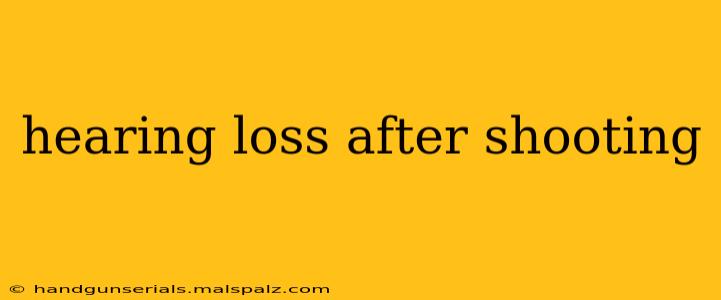Hearing loss is a significant concern for anyone who participates in shooting sports, from casual target practice to competitive shooting. The intense, close-range exposure to gunfire can cause Noise-Induced Hearing Loss (NIHL), a permanent and often debilitating condition. This article delves into the causes, symptoms, prevention, and treatment of hearing loss after shooting, providing crucial information for both novices and experienced shooters.
Understanding the Dangers of Gunfire to Hearing
The loud report of a firearm generates sound waves far exceeding safe levels for human hearing. These intense sounds can damage the delicate hair cells within the inner ear, responsible for transmitting sound signals to the brain. Repeated exposure, even to seemingly moderate noise levels, accumulates damage, leading to gradual hearing loss. The severity of hearing loss depends on factors like:
- Caliber of the firearm: Larger calibers generally produce louder sounds.
- Type of firearm: Different firearm designs can affect the intensity and frequency of the sound produced.
- Distance from the firearm: Closer proximity to the muzzle results in significantly higher sound exposure.
- Hearing protection used: The effectiveness of hearing protection is critical in mitigating noise-induced damage.
- Duration of exposure: Prolonged shooting sessions increase the risk of cumulative damage.
Types of Hearing Loss from Shooting
NIHL resulting from shooting often presents as:
- Sensorineural hearing loss: Damage to the hair cells in the inner ear, often permanent. This is the most common type of hearing loss resulting from gunfire.
- Tinnitus: A persistent ringing, buzzing, or hissing sound in the ears. This can be a symptom of NIHL and can be incredibly debilitating.
- Hyperacusis: Increased sensitivity to everyday sounds, making normal noises seem uncomfortably loud.
Protecting Your Hearing on the Range
Prevention is key to avoiding NIHL. Implementing the following strategies can significantly reduce your risk of hearing loss:
1. Always Use Hearing Protection
This is the single most effective preventative measure. Choose from:
- Hearing Protection Ratings (NRR): Pay close attention to the Noise Reduction Rating (NRR) of your earmuffs or earplugs. Higher NRR values indicate better protection.
- Electronic Hearing Protection: These devices amplify ambient sounds while suppressing hazardous noise levels, allowing for communication while still protecting your hearing.
- Combination Protection: Using both earmuffs and earplugs offers the highest level of protection.
2. Maintain Safe Shooting Practices
- Proper firearm handling: Ensure your firearm is properly maintained and functioning correctly to minimize unexpected loud noises.
- Appropriate shooting environment: Choose a shooting range with proper sound dampening measures.
- Shooting distance: Maintain a safe distance from the firearm during shooting.
3. Regular Hearing Check-ups
Schedule regular hearing tests, especially if you frequently participate in shooting activities. Early detection of hearing loss allows for timely intervention and can help prevent further damage.
What to Do If You Suspect Hearing Loss
If you experience any symptoms of hearing loss, such as tinnitus, reduced hearing, or difficulty understanding speech, seek immediate medical attention. An audiologist can conduct a comprehensive hearing evaluation to determine the extent of the damage and recommend appropriate treatment options.
This might include:
- Hearing aids: These devices amplify sounds to compensate for hearing loss.
- Assistive listening devices: These devices can improve your ability to hear in specific situations, such as conversations or presentations.
- Tinnitus management techniques: Various therapies and strategies can help manage tinnitus symptoms.
Protecting your hearing is crucial for maintaining overall health and well-being. By understanding the risks associated with shooting and implementing appropriate preventative measures, you can significantly reduce your chances of developing NIHL and enjoy your shooting hobby for years to come. Remember, your hearing is irreplaceable.

